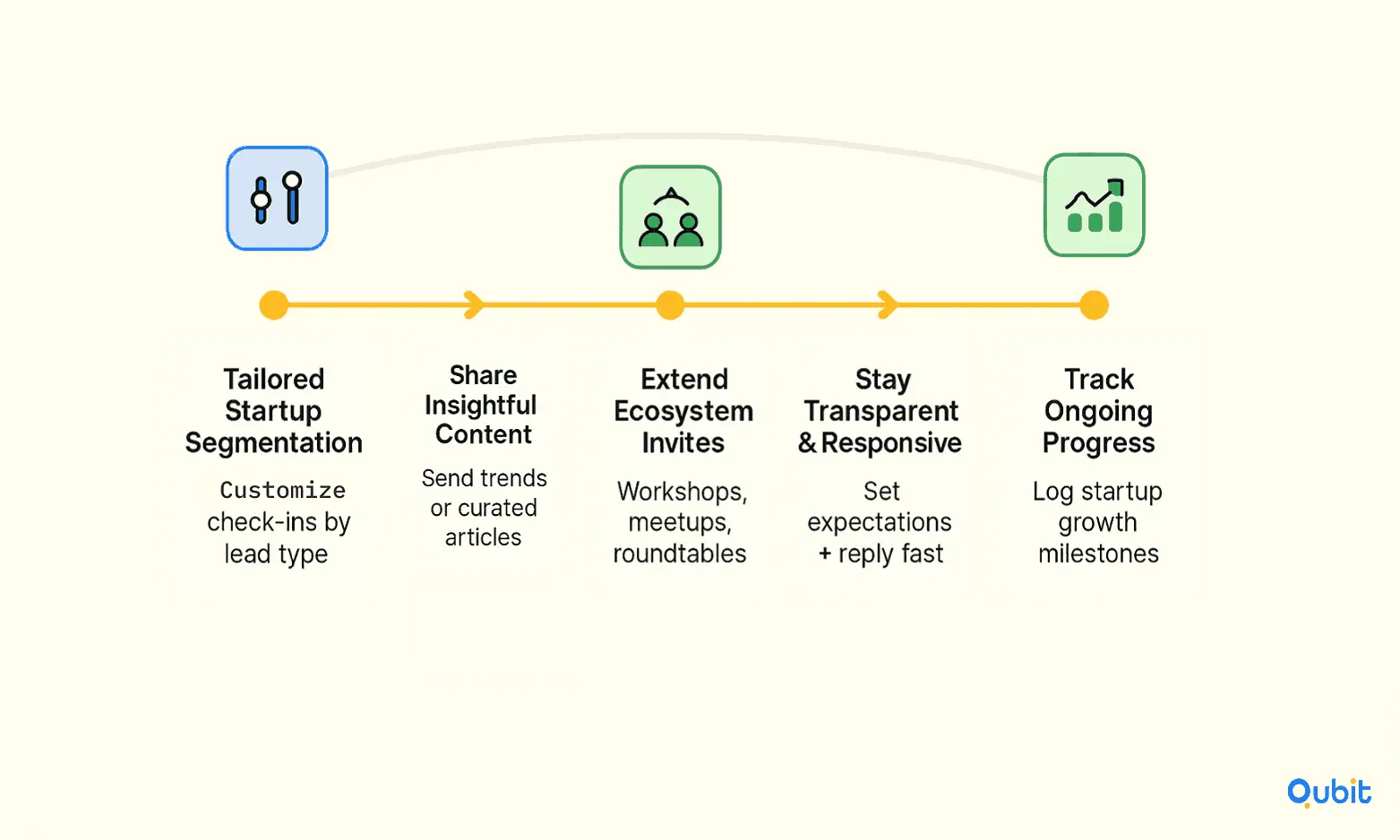A well-crafted deal sourcing strategy is essential for identifying and securing high-potential startups in a competitive market. By combining relationship-driven approaches with data-backed insights, investors can build a robust pipeline that consistently delivers promising opportunities.
Your proactive deal sourcing strategy builds on the foundation provided by startup scouting strategies, offering a comprehensive framework for early-stage startup identification. With closure rates for relevant deals ranging from 16.5% to 17.6%, as highlighted in the Deal Origination Benchmark Report, a systematic approach can significantly enhance your pipeline success.
Proactive Deal Sourcing Strategies for Investors
Effective deal sourcing is the cornerstone of successful investing. By adopting a proactive approach, investors can uncover high-potential opportunities that might otherwise remain hidden. This section explores seven strategic pillars that can transform your deal sourcing efforts into a competitive advantage.
1. Geographic Diversification
Expanding your search beyond local markets can open doors to untapped opportunities. By exploring regions with emerging industries or favorable economic conditions, investors can diversify their portfolios and mitigate risks. Geographic diversification also allows you to capitalize on unique market dynamics that might not exist in your home region.
2. Social Media Engagement
Social media platforms are no longer just for networking—they’re powerful tools for deal sourcing. Platforms like LinkedIn and Twitter enable investors to connect directly with founders, industry experts, and other stakeholders. Regular engagement through posts, comments, and direct messages can position you as a thought leader, attracting inbound opportunities.
3. Alliance Building
Strategic partnerships with accelerators, incubators, and venture capital firms can significantly enhance your deal flow. These alliances provide access to a curated pipeline of startups and businesses that align with your investment thesis. Your analysis benefits from incorporating insights from inbound vs outbound startup deal flow, which differentiates distinct sources of startup opportunities and refines your approach.
4. Proactive Outreach
Waiting for opportunities to come to you can limit your options. Instead, actively reaching out to promising startups or businesses can yield better results. Personalized communication, such as tailored emails or calls, demonstrates genuine interest and sets the stage for meaningful conversations.
5. Robust Investment Criteria
Establishing a clear investment thesis with well-defined criteria is essential for filtering opportunities efficiently. This ensures that your efforts are focused on deals that align with your goals, reducing time spent on unsuitable prospects. A robust framework also helps in communicating your priorities to potential partners and collaborators.
6. Data-Driven Insights
Harnessing the power of data analytics can elevate your deal sourcing strategy. Advanced tools, such as AI-driven analytics and relationship intelligence platforms, enable you to identify trends, assess market potential, and evaluate businesses with precision. Data-driven insights not only improve decision-making but also help you stay ahead of competitors.
7. Specialized Deal Sourcing Platforms
Dedicated platforms designed for deal sourcing can streamline your efforts. These platforms aggregate opportunities from various sources, offering a centralized hub for evaluation. By employing these tools, investors can save time and focus on high-quality prospects that meet their criteria.
Proactive deal sourcing requires a combination of strategic thinking, technological adoption, and relationship building. By implementing these seven pillars, investors can create a sustainable pipeline of opportunities and maximize their chances of success.
Technology and Process Enhancements for Deal Sourcing
Modern deal sourcing has evolved into a sophisticated blend of technology and traditional methods, creating a more efficient and predictive framework for success. Technology enhancements, such as advanced CRM platforms and predictive analytics, are transforming how businesses identify and evaluate opportunities. By integrating these tools, decision-makers can access real-time insights that refine their strategies and reduce guesswork.
One of the most impactful advancements is the consolidation of data silos. CRM integrations now allow teams to centralize relationship intelligence and automate manual processes, saving time and improving accuracy. For example, predictive analytics embedded within CRM systems can assess potential deals based on historical data, market trends, and performance indicators. This data-driven analytics approach ensures that businesses focus their efforts on the most promising opportunities.
The increasing reliance on data-driven screening is reshaping deal sourcing strategies. By combining traditional methods with technology, businesses can achieve a more holistic view of potential investments. Your strategy gains further depth when considering startup scouting at tech conferences, as it details specific approaches that align event-based interactions with proactive sourcing.
Founder-Centric Relationship Building
While you mention relationship-building generally, emphasizing a founder-centric approach can be compelling. This involves proactively nurturing trust and long-term connections with founders well before they need capital. Examples include:
- Hosting informal meetups, workshops, or “office hours” where founders can get advice and build rapport.
- Providing non-financial value such as mentorship, introductions, or access to your network.
- Being transparent about decision timelines and feedback, building goodwill.
By putting founders at the center of your sourcing philosophy, you become a preferred investor – increasing inbound deal flow and the quality of relationships.
Alternative Investment Strategies and BD Approaches
Expanding beyond traditional deal sourcing methods can open new doors for investors seeking a competitive edge. Alternative investment strategies, such as take-private deals, and innovative business development (BD) approaches offer fresh perspectives on identifying and securing opportunities. These methods not only diversify the pipeline but also enhance the ability to uncover hidden value in the market.
Take-private deals, for instance, involve acquiring publicly traded companies and transitioning them into private ownership. This strategy allows investors to focus on long-term growth without the pressures of quarterly earnings reports. By working closely with specialized advisors, investors can identify undervalued companies with strong potential for transformation. These advisors bring niche expertise, helping to uncover opportunities that might otherwise remain overlooked.
On the business development front, adopting broader strategies can significantly enhance deal flow. Building relationships with industry insiders, attending sector-specific events, and leveraging data-driven tools to analyze market trends are all effective ways to stay ahead. For a deeper dive into managing investment pipelines effectively, your exploration of advanced sourcing methods is complemented by deal sourcing for investors, where additional details on managing the startup pipeline enhance your overall strategy.
Integrating Diversity and Inclusion in Deal Sourcing
1. Strategies to Scout Underrepresented Founders and Startups
- Proactively Target Diverse Networks: Attend pitch events, demo days, and conferences focused on women, minority, LGBTQ+, or otherwise underrepresented founders. Follow niche media, join affinity group forums, and subscribe to newsletters spotlighting diverse startup communities.
- Leverage Online Databases: Utilize databases and innovation platforms tracking diverse teams and founders (e.g., Hello Alice, Diversity VC directory, The Funded).
- Tailor Application Processes: Rethink language in your application and outreach. Ensure materials signal a welcoming environment for all backgrounds and minimize unnecessary barriers (such as an overemphasis on elite academic pedigrees).
2. Partnering with Diversity-Focused Accelerators or Networks
- Formal Partnerships: Build alliances with incubators, accelerators, and VCs that have a demonstrated commitment to supporting underrepresented entrepreneurs (e.g., Black Founders, Women Who Tech, MassChallenge).
- Mentorship and Sponsorship: Offer mentorship programs, workshops, or “office hours” specifically targeting underrepresented founders, providing advice, feedback, and networking opportunities that fuel pipeline development.
- Sponsor Diversity Initiatives: Consider sponsoring hackathons, innovation prizes, or founder summits that elevate new talent and help you become a recognized champion in the space.
3. Reviewing Sourcing Funnels to Minimize Bias
- Audit Your Pipeline: Regularly analyze your deal funnel demographics: who is applying, advancing, and receiving offers? Use these metrics to identify gaps or drop-off points that may signal hidden bias.
- Implement Blind Screening: Consider masking founder demographics, universities, or locations during the initial screening to focus first on traction and solution fit.
- Train Your Team: Invest in unconscious bias training and ensure your staff is aware of the business and ethical case for diversity.
Post-Deal Sourcing Feedback Loops
Making sourcing more effective is an ongoing process, one that benefits dramatically from post-deal analysis and continuous learning. Instituting robust feedback loops ensures your efforts adapt and improve, turning every sourcing cycle into an opportunity for growth.

1. Regularly Review Deal Outcomes
- Track Conversion Rates: Assess which souring channels produce the most investments and, crucially, which generate the highest-performing startups over time.
- Conduct Post-Mortems: After each investment, analyze the journey: What factors or signals led the deal to cross the finish line? Where did other prospects drop off, and were there missed opportunities? Gather input from both founders and your internal team.
2. Identify Success and Failure Correlates
- Data Analysis: Use CRM and analytics platforms to map characteristics of startups that succeeded (or failed) post-investment. Was there a common founder background, industry, or business model?
- Qualitative Feedback: Interview portfolio founders and rejected candidates for candid feedback about your process and perceptions.
3. Adjust Sourcing and Evaluation Approaches
- Refine Channel Mix: Double down on channels, communities, and events with strong conversion and performance. Sunset low-yield approaches.
- Update Criteria and Processes: Tweak your screening scorecards, outreach messages, or application requirements based on what’s actually yielding investment-grade startups.
- Share Learnings: Create a feedback culture by sharing outcomes and lessons with your entire scouting and investment team, ensuring alignment and ongoing improvement.
Conclusion
Securing high-potential startups requires a thoughtful combination of relationship-driven strategies and data-backed insights. Throughout this blog, we’ve explored proactive deal sourcing techniques that prioritize building meaningful connections while leveraging technology to uncover hidden opportunities. By implementing these actionable steps, you can enhance your ability to identify and invest in startups that align with your goals.
If you’re ready to take your deal sourcing to the next level, our Startup Scouting service is here to help. We specialize in identifying startups that match your investment criteria, ensuring your pipeline remains robust and future-focused. Contact us today to revitalize your approach and secure your next big opportunity.
Key Takeaways
- Proactive deal sourcing fuses relationship-building with data-driven analytics.
- Geographic diversification and social media engagement are crucial for a robust startup pipeline.
- Advanced CRM and data tools enhance deal evaluation and decision-making.
- Clear investment theses and criteria streamline opportunity filtering.
- Alternative BD strategies offer additional avenues to optimize pipeline performance.
Frequently asked Questions
What is deal sourcing?
Deal sourcing is the process of identifying, evaluating, and engaging with potential investment opportunities using both relationship-driven and technology-enabled strategies. For example, a VC may use LinkedIn networking alongside automated scouting tools to surface promising pre-seed startups.






